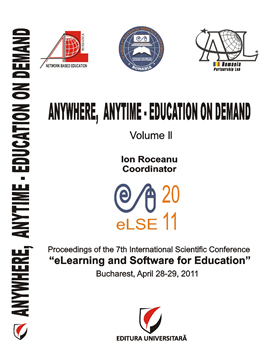INADEQUACIES OF THE DISCOURSE SUPPORT VIA e-LEARNING
INADEQUACIES OF THE DISCOURSE SUPPORT VIA e-LEARNING
Author(s): Adrian Lesenciuc, Daniela Nagy, Cosmina-Oana DraghiciSubject(s): Education
Published by: Carol I National Defence University Publishing House
Keywords: discourse support; didactic discourse; e-learning; e-locution; elocution.
Summary/Abstract: One of the productive modalities of exploring the e-learning constitution fundamentals would be to take the sinuous path of its re-inception as implementation of the didactic discourse. In fact, this implementation should consider particular contextual elements, thus leading to a specific performance: e-locution. The didactic virtual discourse support requires a high level of communicative competence. Nevertheless, the communicative competence needs to be perceived as a synthesis of grammatical, textual, socio-linguistic, illocutionary and strategic competences. Consequently, one cannot focus only on the coherence, cohesion, informational and pertinence requirements, but equally on an efficient exploitation of the performance dimensions connected with obtaining the intended effects upon the audience, and respectively, on the ability of discourse self-regulation. E-locution, perceived as style of virtual discourse, has rather become an illusion consisting of texts withdrawn from the patronage of natural language, which, irrespective of their production and rendering manner, delimit themselves from the functional relation between forms and content. These texts abandon any intention of being based on communication from the start. The focus shift from relation towards content, from effects aimed at the receiver towards the informational content and the abandonment of the natural self-regulatory manner by appeal to the meta-linguistic possibility of relating to its own contents, moves e-locution away from the constitutive requirements seen as a specific modality of discourse support within the didactic endeavor. Moreover, the illocutionary competence, and especially, the strategic one, find but barren soil, in which the seed of discourse support cannot bear fruit. Likewise, the strategic competence involves a continuous adjustment at the relation level, and not at the contents level. In this context, there raises the issue of appealing to the level required by the didactic performance, under the circumstances where e-locution implies the abandonment of relation and where the focus is not on the meaning negotiation between message and the virtual audience but, in accordance with the technological determinism theory, the medium is perceived as a message itself. Consequently, the inadequacy does no longer consist of the discourse support via e-locution, but of the very constitution of textual pertinence, in relation with the didactic endeavor via elocution, which becomes the implementation of the discourse art.
Journal: Conference proceedings of »eLearning and Software for Education« (eLSE)
- Issue Year: 7/2011
- Issue No: 02
- Page Range: 167-172
- Page Count: 6
- Language: English

